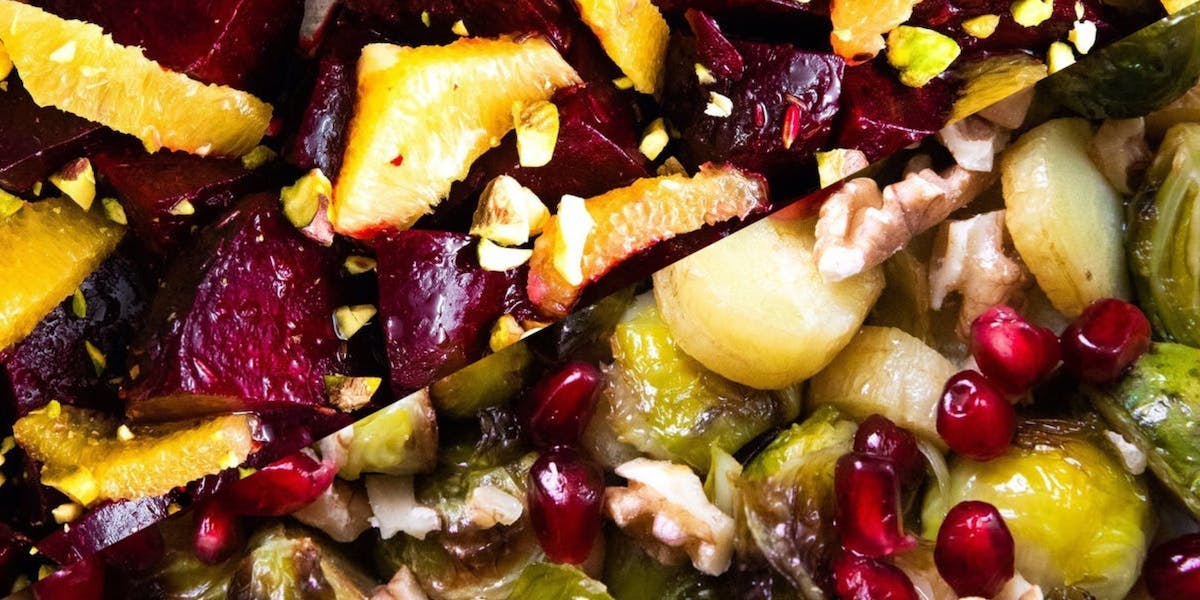Lifestyle
Combining Diets: Vegan and Paleo
by Aly Findlay
5min read
If you’re looking to explore a prehistoric plant-based food plan, read on for our guide on combining Vegan and Paleo, plus an all-important Vegan Paleo food list.
At first glance, it might seem that Vegan and Paleo don’t mix. One is based entirely on the power of plants, whilst the other is inspired by the diets of our hunter-gatherer ancestors (meat included). Despite the differences, however, we believe that the two can be effectively combined. As long as you keep a flexible, playful attitude towards your food, it’s more than possible to integrate elements from both into your diet.
- What is the paleo diet?
- Why follow a paleo diet?
- What is vegan paleo?
- Vegan paleo meal plan
- Are there cons?
What is the Paleo diet?
Eating a paleo diet aims to recreate the food habits of our ancient ancestors, focusing on high quantities of vegetables, fruits, nuts, and meats, whilst avoiding processed foods.
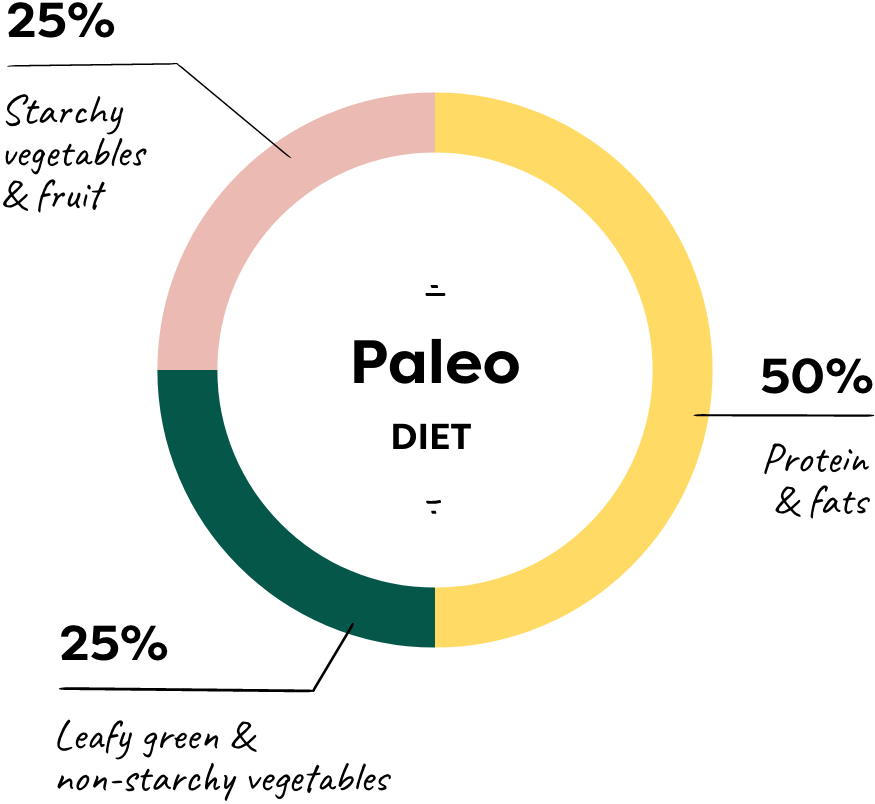
The foundations of a paleo diet are based on eating how our distant ancestors ate in the Paleoltihic era, which ended around 10,000 years ago (before the development of agriculture!). It prioritises non-processed foods and focuses on large quantities of vegetables, fruit, meat, and nuts – basically anything that could be scavenged from the undergrowth, plucked from trees or hedges, or hunted down in the forest.
What you won’t find on a paleo plate, therefore, are foods high in processed or added sugars, salts, and trans fats (as found in fried foods, for example) or artificial sweeteners. Also off limits is dairy and anything containing grains (ie. pasta and rice) or legumes, since these have been processed through artificial means and contain ‘anti-nutrients’.
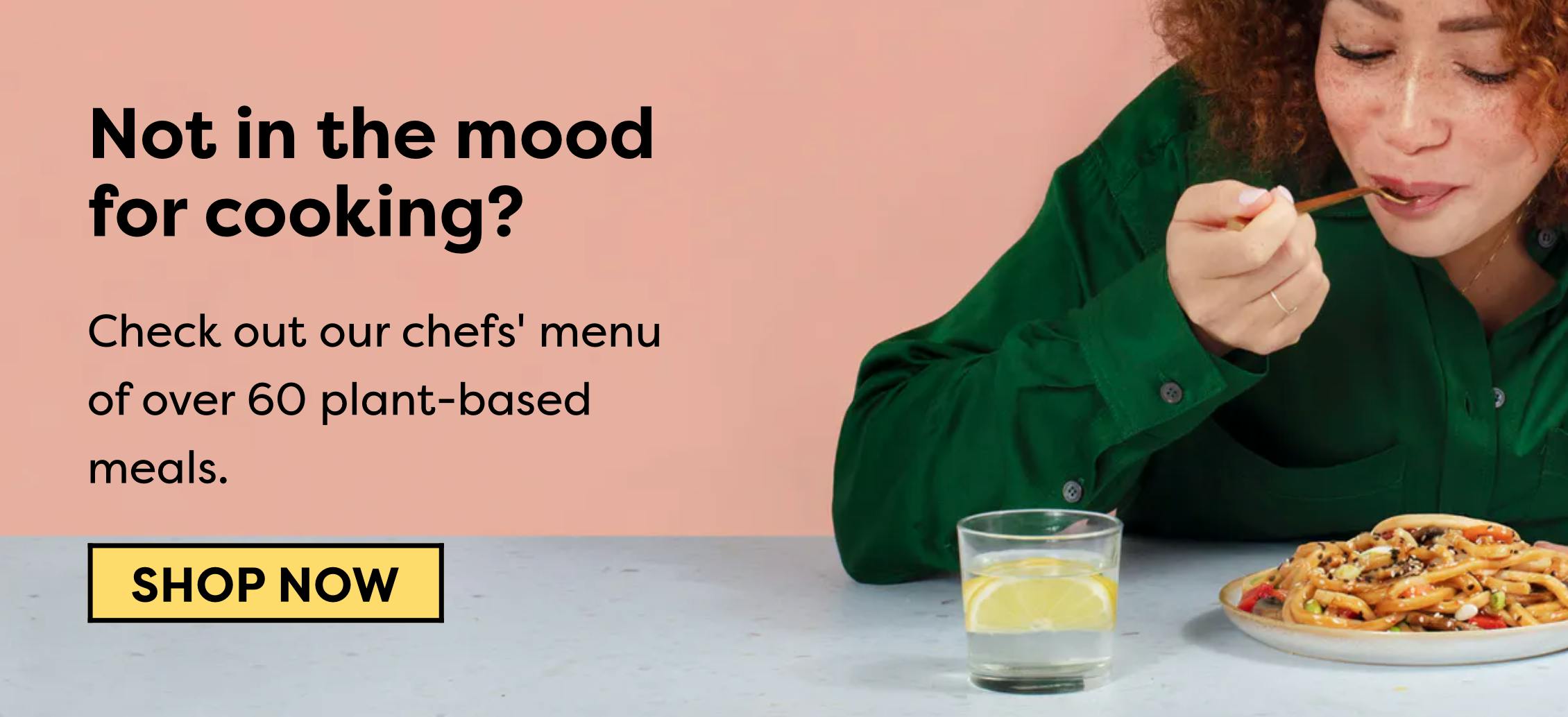
Why follow a paleo diet?

With its concentration on whole foods and lots of vegetables, the paleo diet is thought to have multiple health benefits, including:
- Improved total cholesterol – Several studies have demonstrated the impact of a paleo diet on heart health, including the total amount of cholesterol found in the blood. A 2015 study revealed that those following a paleo diet have substantially lower total cholesterol levels when compared to an ‘average’ diet. So that’s lower LDL (low-density lipoproteins, aka bad cholesterol), triglycerides and HDL (high-density lipoproteins, aka good cholesterol).
- Less inflammation – It’s thought that a low carb diet can help to reduce the risk of inflammation (supposedly, because the body does not need to produce a large amount of insulin to absorb glucose). Although more research is needed to establish the connection between a paleo diet and reduced inflammation, a 2016 study concluded that switching from a calorie-heavy, processed Western diet reduced the chance of inflammation developing.
- Weight loss – Fewer carbohydrates and less processed food can lead to weight loss (as long as you’re in calorie deficit). A 2016 study undertaken in Australia showed that the paleo diet fared better against low-fat diets in terms of weight loss. It’s worth noting, however, that this is still a grey area – conclusive evidence is hard to obtain due to the multitude of factors at play including genetics, activity levels and food preferences – turning to a paleo is by no means a surefire way of losing weight.
- More energy – Foods that are low on the Glycemic Index (GI) scale help you feel more energetic. This is because they help you to maintain steady, consistent energy levels, thus avoiding the ‘crash’ that usually happens after eating carbs or sugary foods.
What is Vegan Paleo?

Strictly speaking, a vegan paleo diet isn’t 100% paleo. This might seem a little strange, but bear with us.
A vegan diet doesn’t contain any animal or dairy products and relies solely on plant-based foods (and typically encourages a lot of legumes, pulses, grains). A paleo diet, on the other hand, contains meat, fish, and eggs, whilst leaving out these grains and legumes. This raises a problem. A diet that lacks all animal products as well as beans and legumes isn’t well-balanced, and could lead to nutritional deficiencies if followed for a sustained period. Amino acids, B vitamins, fibre, and protein could all suffer under a diet that’s strictly vegan and paleo at the same time.
Something has to give. If you’re not strictly vegan, then one option that might work for you is a ‘pegan’ diet. In essence, a pegan diet is the same as paleo, just with much fewer animal products; fruit, vegetables, and nuts make up three quarters of your plate, whilst meat, fish, and eggs fill the rest.
A vegan paleo diet, however, doesn’t contain any of these animal products. Whilst it has a similar focus on fresh fruit and vegetables, it also includes certain grains to broaden its nutritional value; quinoa, amaranth, and buckwheat are all low-carb, high-protein options that can be incorporated into a vegan paleo diet. Where it doesn't contain meat, dairy and eggs (the paleo part), to follow healthily as a vegan, these are substituted with certain grains (normally excluded in a paleo diet).
List of paleo vegan foods
Leafy Greens + non-starchy Veg:
- Broccoli
- Kale
- Peppers
- Onions
- Carrots
- Tomatoes
Starchy Veg + Fruit:
- Potatoes
- Sweet potatoes
- Yams
- Turnips
- Apples
- Bananas
- Oranges
- Pears
- Avocados
- Strawberries
- Blueberries
Protein (nuts and seeds also a source of healthy fats):
- Almonds
- Macadamia nuts
- Walnuts
- Hazelnuts
- Sunflower seeds
- Pumpkin seeds
Fat:
- Olive oil
- Coconut oil
- Avocado oil
- Almond oil
Vegan paleo meal plan
If you’re wondering how to follow a vegan version of paleo and you’d like to try out this prehistoric-inspired, plant-based diet, here are some ideas to get you started:
Breakfast
Start the day with a bowl of crunchy grain-free granola, dusted with cinnamon and given a twist of orange zest. Or if you prefer a more savory breakfast, our mexican inspired vegan breakfast tacos (without the tortilla) could be just the trick.
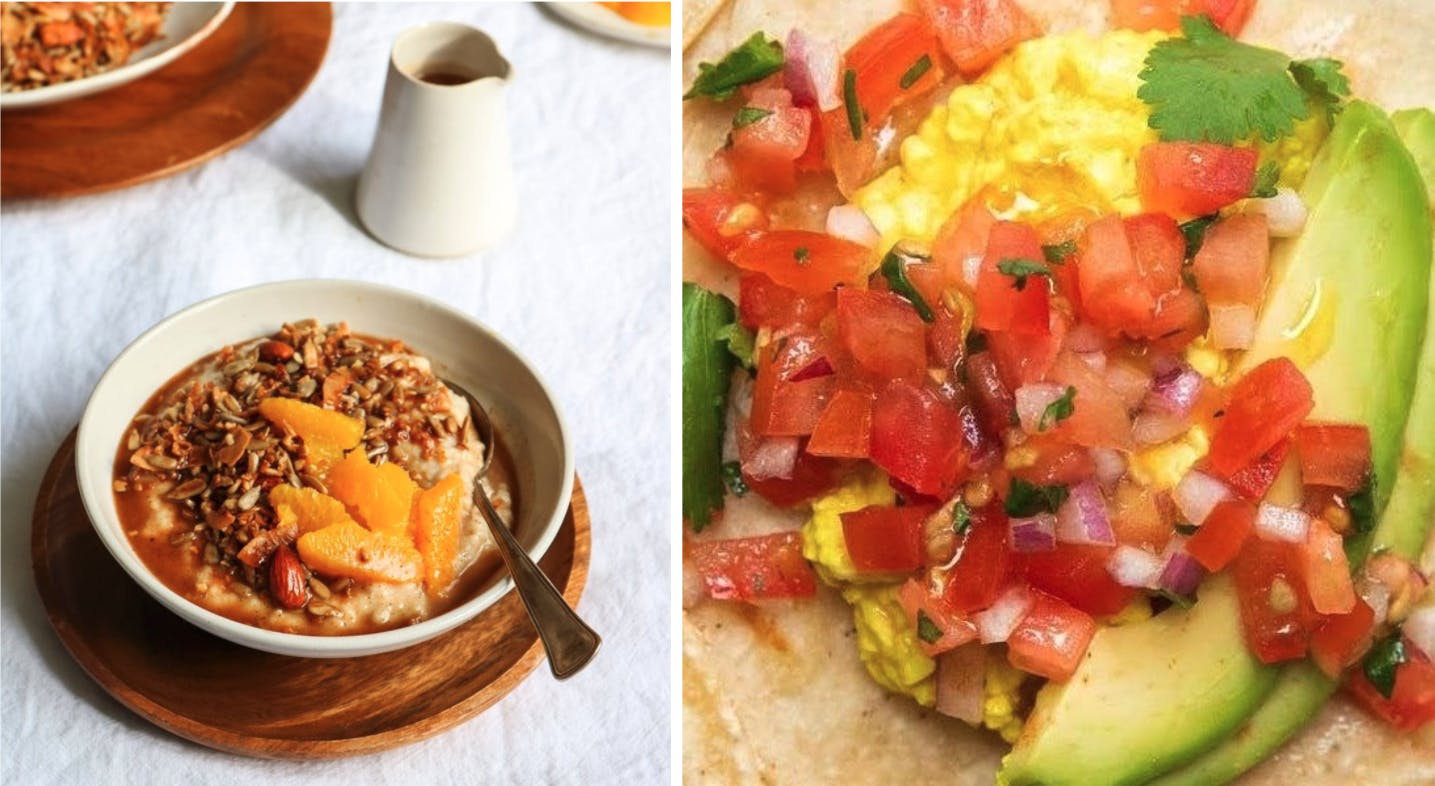
Lunch
Roasted until tender, earthy beets tossed with slices of tangy oranges and topped with pistachios provide a filling lunchtime meal. For something a little lighter but no less satisfying, a vegan caesar salad is an ideal choice, with the creamy cashew dressing offering a healthy source of fat.
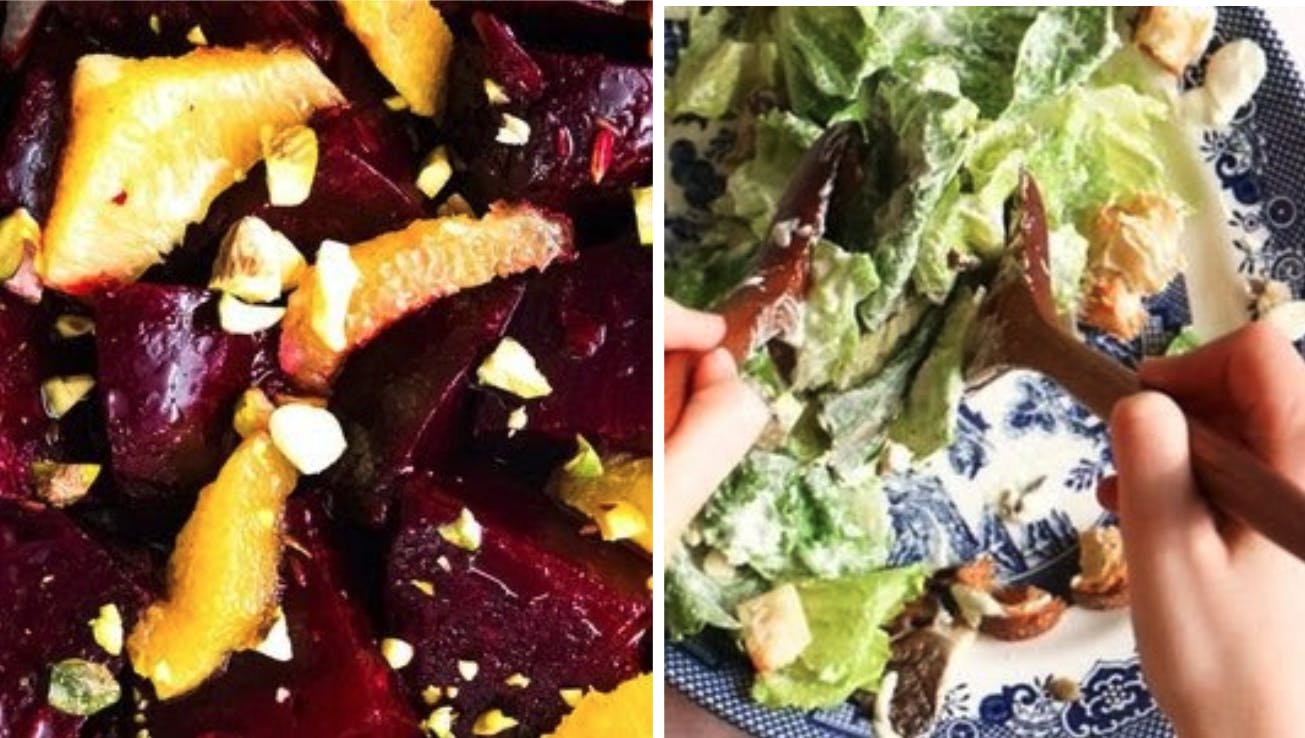
Dinner
Sweet potatoes loaded with sesame-lime slaw, coconut yogurt and a peanut dressing offer a hearty, low-carb dinner. When the colder months arrive along with bounties of root vegetables, try a parsnip and brussels sprouts bake – top with toasted walnuts and pomegranates for a perfect side or main dish.
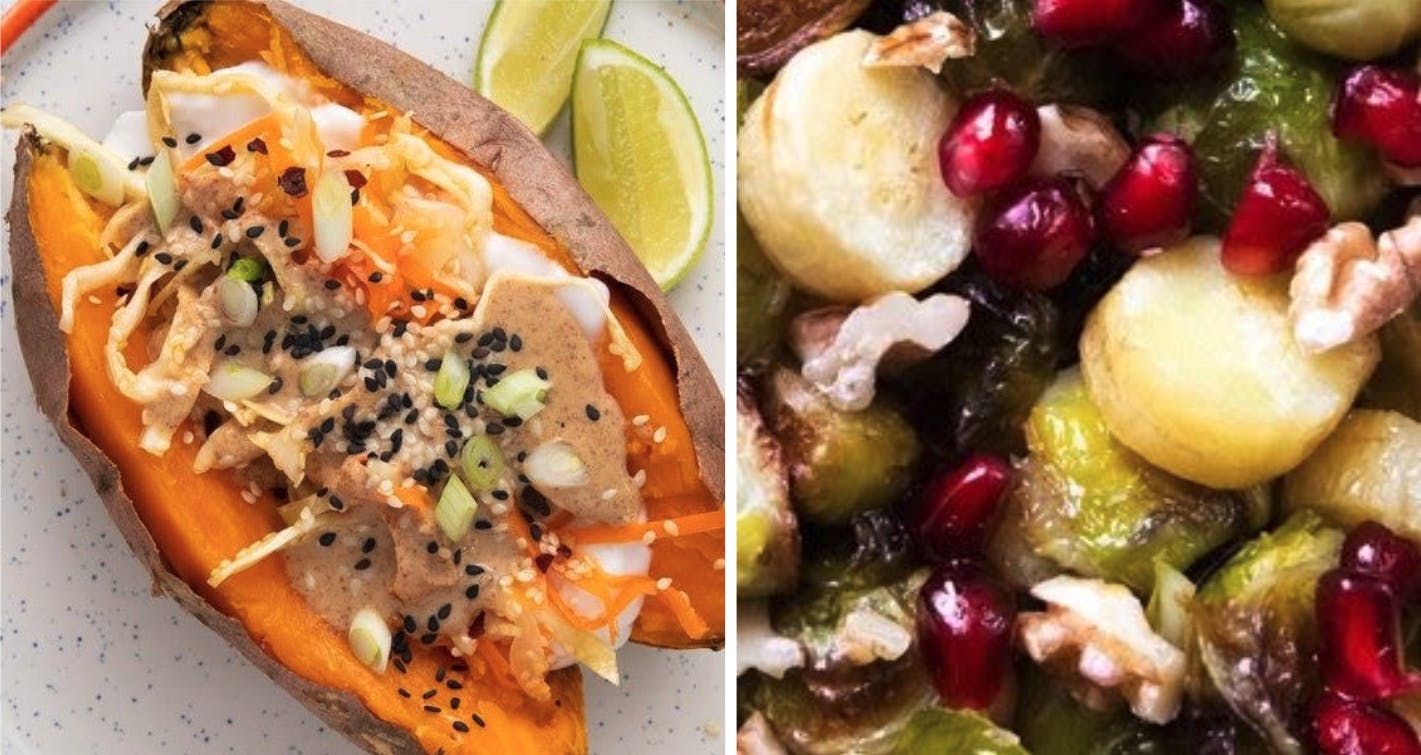
Are there cons?
If you were to follow a strictly paleo diet but omit all the animal products to make it a vegan paleo diet, there is a risk of certain vitamin and mineral deficiencies given the restrictions on certain grains and carbohydrates As already mentioned, amino acids, fibre, and protein could be lacking in vegan paleo diets if not controlled properly. If you’re considering trying out a plant-based paleo diet, we’d recommend speaking to a professional nutritionist beforehand to ensure you’re aware of any risks that are specific to your health.
Getting more plants into your diet is a sure way to improve your health and wellbeing. Check out our blog which explores a wide range of health-related topics – from which fats to eat as a vegan to plant-based foods to power your running.
By Aly Findlay
Aly is our go-to nutrition hero as she studied Human Nutrition at uni (makes sense, right?). She’s also always on hand to help our customers, and provide our team with coffee. Lots and lots of coffee.
Let us take care of dinner
We help to make eating more plants easy and delicious. Fancy letting us take care of dinner? Check out our delicious meals here.
Shop now
